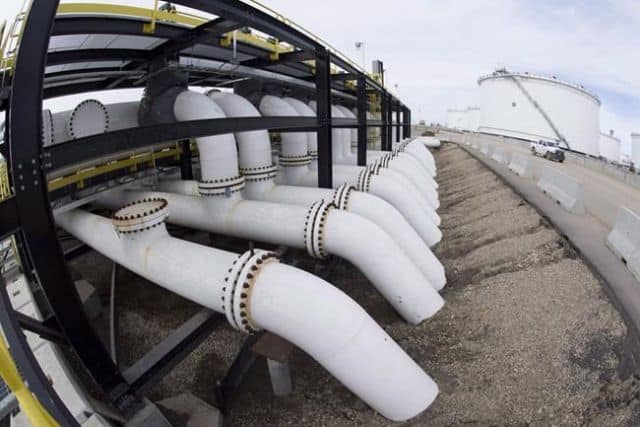
A Federal Court judge has granted the British Columbia government a temporary injunction against an Alberta law that could have limited oil exports to other provinces.
Justice Sebastien Grammond says Alberta’s so-called turn-off-the-taps legislation raises a serious issue and could cause irreparable harm to the residents of B.C.
He says B.C. has met the test for blocking the law until the courts can decide its validity.
“British Columbia has met the criteria usually applied by the courts for the issuance of such an injunction,” Grammond wrote in his decision.
“It has shown that the validity of the Act raises a serious issue. It has demonstrated that an embargo of the nature evoked by the members of Alberta’s legislature when debating the Act would cause irreparable harm to the residents of British Columbia.”
The legislation gives Alberta the power to crimp energy exports from the province.
It was passed, but never used, by Alberta’s former NDP government as a way to put pressure on B.C. to drop its fight against the Trans Mountain oil pipeline expansion to the West Coast.
The new United Conservative government proclaimed it into force shortly after Premier Jason Kenney was sworn into office in April, but he had said it wouldn’t be used unless B.C. throws up further roadblocks to the pipeline.
B.C. has called the law a loaded gun and had asked the courts to make sure it didn’t accidentally go off.
The Trans Mountain expansion, first approved in 2016, would triple the amount of oil flowing from the oilsands to B.C.’s Lower Mainland and from there to lucrative new markets across the Pacific.
The federal government bought the existing pipeline last year for $4.5 billion after its original builder, Texas-based Kinder Morgan, threatened to walk away from the project because of B.C.’s resistance.
The Federal Court of Appeal quashed the approval months later on the grounds that there hadn’t been enough consultation with First Nations or consideration of the pipeline’s potential impact on marine wildlife.
The project was approved for a second time by the federal cabinet this summer.


